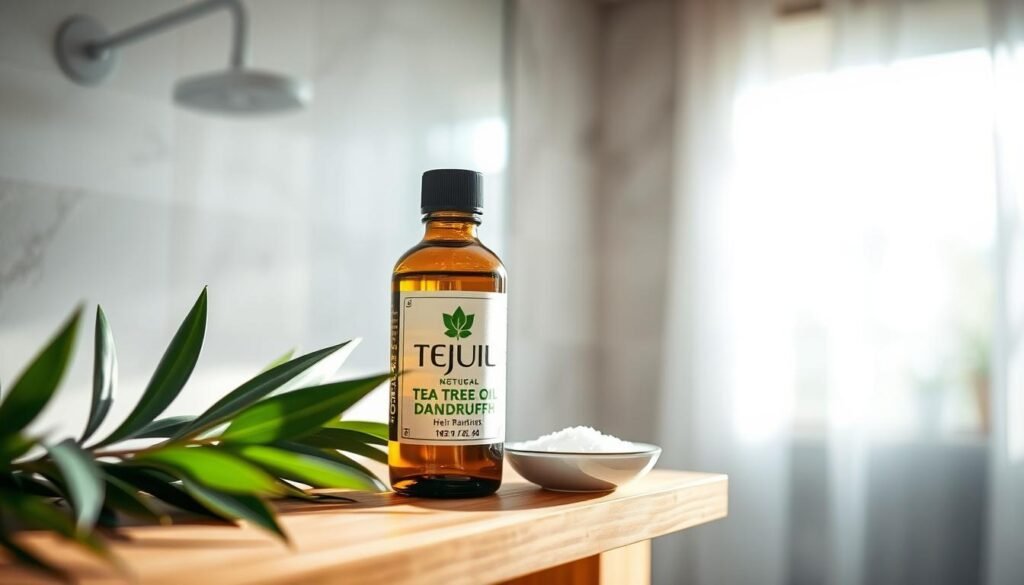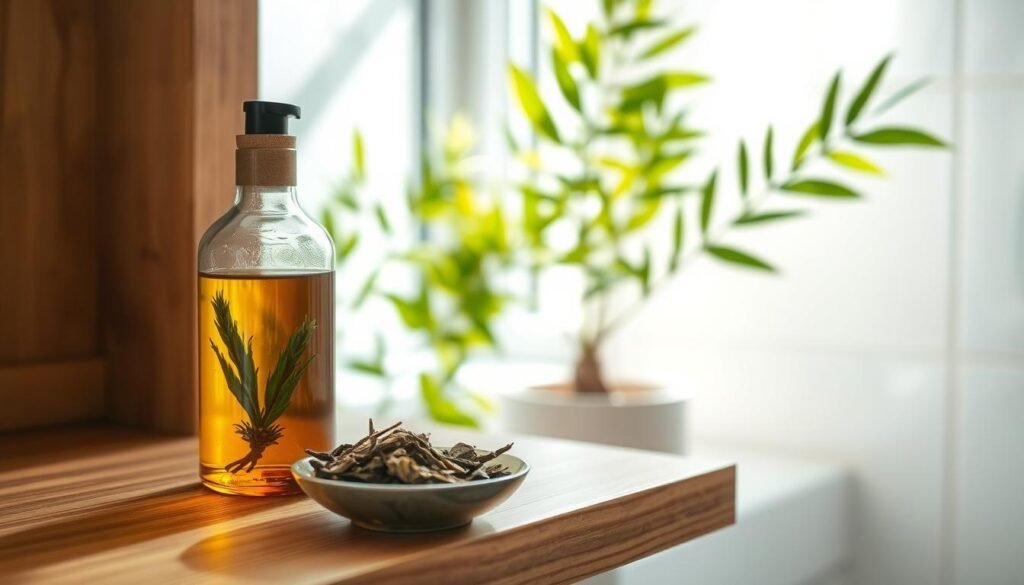Have you ever thought a simple, natural remedy could beat dandruff? Tea tree oil is becoming a popular choice. It has antimicrobial and antifungal benefits that help with dandruff. By reading this, you’ll learn how tea tree oil can give you relief and boost your confidence.
Key Takeaways
- Tea tree oil is recognized for its potent antifungal properties.
- This natural remedy can be an effective alternative to traditional dandruff treatments.
- Understanding the causes of dandruff is crucial when considering remedies.
- Incorporating tea tree oil into hair care routines can enhance scalp health.
- Monitoring skin sensitivity is important when using essential oils.
Understanding Dandruff and Its Causes
Dandruff is a common problem that makes your scalp itchy and flaky. It comes from various factors. Knowing what causes dandruff helps treat it effectively.
Common Triggers for Dandruff
Dandruff has several triggers that can make it worse. Here are the main ones:
- Dry skin: This problem is more common in cold months and leads to more flakes.
- Oily scalp: Too much oil can grow Malassezia yeast, causing dandruff.
- Sensitivity to hair care products: Some people react badly to certain hair products.
Impact of Lifestyle on Scalp Health
Your lifestyle affects your scalp’s health a lot. Stress can make your skin oilier, leading to dandruff. Not eating well can weaken your scalp. Also, things like pollution hurt your scalp and may increase dandruff.
What is Tea Tree Oil?
Tea tree oil is getting more popular because of its many benefits. It comes from the Melaleuca alternifolia tree in Australia. The locals have used it for a long time for healing.
Origin and Extraction Process
Getting the oil from the leaves is key. They use steam distillation. This keeps its healing parts strong.
Uses in Natural Remedies
Tea tree oil helps in many ways because it fights fungi, bacteria, and swelling. It’s good for the skin and scalp. Using it can make your hair and skin better.
Dandruff Home Remedies: Tea Tree Oil
Tea tree oil is a top choice for fighting dandruff. It has strong antifungal qualities. It targets the Malassezia yeast, often responsible for dandruff. Added to hair care, tea tree oil lessens itchiness and flaking.
How Tea Tree Oil Works Against Dandruff
Tea tree oil’s unique makeup fights dandruff by keeping scalp fungus in check. With its use, your scalp may return to its natural healthy state. This often leads to less dandruff and softer hair.
Combining Tea Tree Oil with Other Natural Ingredients
Tea tree oil works even better with other natural items. Mix it with aloe vera for soothing or coconut oil for moisture. These mixes boost tea tree oil’s power against dandruff. Adding these to your hair routine can make a big difference. For more natural remedy ideas, check this resource.

| Natural Ingredients | Benefits |
|---|---|
| Aloe Vera | Soothes irritation and hydrates the scalp |
| Coconut Oil | Provides moisture and nourishes hair |
| Lemongrass Oil | Helps reduce scalp inflammation |
| Zinc | Regulates oil production on the scalp |
Antifungal Properties of Tea Tree Oil
Tea tree oil is known for fighting dandruff effectively. Studies prove it works well against scalp fungi, especially Malassezia. Its compounds directly attack the fungi, stopping them from growing on the scalp.
Scientific Evidence Supporting Effectiveness
Many studies show tea tree oil’s power to fight fungi. It’s as good as many standard antifungal treatments. Tea tree oil lessens dandruff and is safer than many synthetic options.
Comparison with Other Antifungal Agents
Tea tree oil is different because it’s natural and has fewer side effects. Traditional options work but might irritate some people. Tea tree oil, however, improves scalp health gently but effectively. It’s a top choice for fighting fungi without the harsh effects.
Scalp Treatment: Benefits of Tea Tree Oil
Tea tree oil is great for those with scalp issues. It fights itchiness and lessens inflammation. This helps make your hair healthier overall.
Improving Scalp Health and Reducing Itchiness
Tea tree oil is a top choice for fighting dandruff symptoms. Its antiviral, antifungal, and antibacterial traits target yeast that causes discomfort. With regular use, it improves itchiness and scalp health. To learn more, check out the benefits of tea tree oil and consider adding it to your routine.
Instructions for Application
To get the best results, follow these steps. First, mix tea tree oil with a carrier oil to avoid irritation. Here’s a quick guide:
- Mix 5-10 drops of tea tree oil with 1 ounce of carrier oil like coconut or jojoba.
- Apply this blend with your fingertips to your scalp.
- Keep it on for at least 30 minutes, then wash with mild shampoo.
- Do this 1-2 times weekly for the best effects.
Knowing the right application instructions can prevent side effects and ensure maximum benefits. Applying it correctly is key to healing your scalp.
Incorporating Tea Tree Oil into Hair Care Routines
Tea tree oil boosts hair care routines. It’s great for fighting dandruff. Adding it to daily routines can improve scalp health and cut down on flakes.
Best Practices for Usage
To use tea tree oil right, it’s important to dilute it properly. You can mix a few drops with a carrier oil or into your shampoo. This method keeps the oil potent and lowers irritation risks.
- Start with a small amount to gauge sensitivity.
- Gradually increase the concentration if no adverse reactions occur.
- Consider preparing a mixture that can be stored and used over time.
Safety Precautions and Skin Sensitivity
When using tea tree oil, watch out for skin sensitivity. Always do a patch test before using it fully to avoid allergic reactions. Stop use and seek advice if irritation happens.
Consult a doctor about using tea tree oil if you’re pregnant or breastfeeding. Knowing the best practices for tea tree oil makes hair care more enjoyable and beneficial.
| Practice | Description |
|---|---|
| Patch Test | Apply a small amount of diluted tea tree oil on the skin to check for reactions. |
| Dilution | Mix tea tree oil with a carrier oil or shampoo for safer application. |
| Gradual Increase | Begin with a lower concentration and adjust as needed based on tolerance. |
Alternative Essential Oils for Dandruff
Exploring different essential oils can boost the power of tea tree oil against dandruff. Many oils work well with it, each bringing its own strengths. By using these oils, you can make a hair care routine that’s just for you and get better results.
Complementary Oils to Combine with Tea Tree Oil
- Lavender Oil: Known for calming effects, lavender oil helps lessen inflammation and itchiness on the scalp.
- Peppermint Oil: This oil boosts circulation in the scalp, leading to a healthier environment for hair growth.
- Rosemary Oil: Famous for encouraging hair growth, rosemary oil is a top pick for improving hair health.
Benefits of Each Alternative Essential Oil
| Essential Oil | Benefits |
|---|---|
| Lavender Oil | Soothes inflammation and reduces itchiness, adding a nice scent. |
| Peppermint Oil | Enhances scalp circulation, which helps healthy hair follicles. |
| Rosemary Oil | Boosts hair growth and makes hair shiny. |
Using these oils with tea tree oil can better treat dandruff and more. Knowing the benefits of these added oils lets you make customized care for your scalp.
What to Expect When Using Tea Tree Oil
Adding tea tree oil to your hair care might show different results. Users often see changes in a few weeks. How well it works depends on your scalp’s health and how consistently you use it. It’s key to be patient with this treatment.
Timeline for Observing Results
Many report better scalp health after 2 to 4 weeks of regular use. For some, it might take longer to notice a big difference. Mixing the oil with your shampoo might help you see better outcomes.
Potential Side Effects to Monitor
Natural remedies like tea tree oil can sometimes cause side effects. Skin irritation or allergies are possible at first use. Testing on a small skin area before full use is smart. This test helps ensure it’s safe for you.
For deep dive into how tea tree oil tackles dandruff, this article is a good read. Assessing how your body responds is very important.
Looking wider at dandruff issues might give more clues for management. Great insights are offered at this link.
Personal Experiences and Testimonials
People often talk about their success with tea tree oil against dandruff. They share stories of less dandruff and better scalp health. These stories help us understand how tea tree oil fights dandruff effectively.
Success Stories from Users
Many have seen big changes by adding tea tree oil to their hair care. Users mainly talk about:
- Less itchiness and irritation on the scalp
- A quick drop in dandruff flakes
- Better moisture for the scalp
- Healthier, shinier hair
These stories highlight how tea tree oil has helped many people. Users share tips like mixing the oil with others or adding it to shampoo. They remind us that staying consistent is key. Every person’s experience with tea tree oil is unique.

Conclusion
Tea tree oil is a top-notch solution for dandruff. It’s filled with antifungal and antimicrobial benefits. When you use it regularly, it can make your scalp healthier, reduce itchiness, and help your hair grow better. This natural remedy really stands out because it tackles dandruff’s main causes.
Using tea tree oil is also easy, making it a go-to for natural dandruff solutions. With regular use, you can see real improvements in your scalp health and feel better overall. Choosing this effective remedy can boost not just how you look but also your self-confidence.
For those fighting dandruff, tea tree oil is more than just a strong treatment. It supports the overall health of your scalp. This method takes a whole-hair care approach, benefiting your scalp and hair.